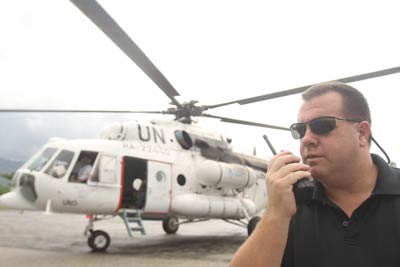
Bridging the Gap - Steve Hailey, ETC NGO Coordinator in Haiti
“I’ve never seen a more holistic approach to emergency collaboration as I’ve seen here in Haiti,” says Steve Hailey, NGO ETC Coordinator in Haiti.

Hosted by World Vision International (WVI), Hailey is the first ever Non-Governmental Organization (NGO) Coordinator for the Emergency Telecommunications Cluster (ETC). “My position is about bridging the gap between UN agencies and NGOs as it pertains to emergency and security telecommunications in Haiti”, says Hailey.
After last year’s devastating earthquake in Haiti, hundreds of NGOs responded bringing in emergency relief supplies and setting up initiatives to support the affected population. It was estimated that as many as 1,300 NGOs were operating in Port au Prince and surrounding provinces in the months following the disaster. As both the global and local lead for the ETC in Haiti, the UN World Food Programme (WFP) recognized the need for more defined NGO representation and took action to create the position with the help of World Vision International.
A key priority of the new NGO ETC Coordinator is to encourage and sustain collaboration between UN agencies and NGOs. “The first few weeks here I was just getting my feet wet, to understand the landscape and operating context,” says Hailey. “This position has never existed before and I had to understand how best to inject my experience into this role to help facilitate the representation of the NGO community on the ETC.”
Prior to joining WVI and the ETC, Hailey worked for over a decade with the American Red Cross and has more than 20 years of progressive disaster IT and Telecommunications experience. In addition to working on-site in over 50 emergencies, Hailey has also been a consultant to a number of international, federal, state, and local agencies and organizations.
“My focus right now is getting the field units - NGOs operating outside Port au Prince - acclimated to the many ETC services available to them. Although we have ETC meetings, information about what’s transpired is not passed down to field units outside the capital. We have started an aggressive campaign to get into the field and far away provinces, and provide briefings and training to these NGOs.”
Despite having been in the position for less than a year, Hailey has already achieved considerable advancements for the NGO community. “We have worked to institute a separate VHF 'NGO interoperability channel' specifically for members with non-standard equipment. Although this is something that has never been done before, it was identified as a need given the situation on the ground.”
“The ETC follows the MOSS standard, and as part of it recommends the use of Select V protocol,” says Hailey. “But there were NGOs which had already purchased other types of equipment when they first came into town. The ETC is required to provide services for collaboration and cooperation between UN agencies and NGO’s, including users with “standardized” radios. It was carefully determined that there was a need to have a repeater with an interoperable channel and we work carefully to establish this.”
The exact number of NGOs physically present in Haiti is still uncertain. “I think there are approximately 1000 at the moment,” says Hailey. “Currently there are just under 100 active NGOs that continue to use ETC services on a daily basis.”
“The ETC concept is definitely a worthwhile endeavor,” says Karen Barsamian, ETC Coordinator in Haiti. “It is important to have active participants from both UN agencies and NGOs here in the field in order to make the concept successful. Agencies and organizations will only get out what they put in.”
“We are currently working on a transition strategy from an Emergency Telecommunications Cluster into a longer term ICT Working Group. We are working out how best to do this with minimal amount of disruption of services to the humanitarian community. As we transition out, I sincerely hope the local offices of UN agencies and NGOs continue to work together far after we’re [the ETC] gone,” says Barsamian.
“This position has been a difficult one, but I always look forward to a good challenge in my life,” says Hailey. “I like to utilize my experience and expertise to help people in need; help them to prepare for, respond to, and recover from, emergencies and disasters. Providing voice and data communications is “key” to allow those things to happen. I’m extremely proud and humbled to be able to help out and to be a part of the ETC team here in Haiti.”